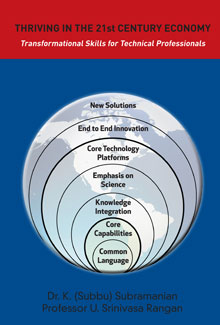Transforming Your Technical Skills
Transforming Your Technical Skills
ASME recently released a new book, “Thriving in the 21st Century Economy”, on how technical professionals can transform their skills in a global economy. This 183-page book is perfect for early career engineers to help them develop a logical approach towards a successful career.
"This book is very timely for understanding the link between education and employment in a binary economy. The authors provide a lucid framework for technical professionals to become T-shaped systems thinkers, who can get in-depth as well as work on a wider bandwidth, as required,” Dr. James C. Spohrer, Director, IBM University Programs World-Wide (IBM UP), Innovation Champion, IBM Almaden Research Center, San Jose, CA, USA
What you will not find in the book is how to find a job, how to improve your resume or how to ace an interview. It talks about using all of your professional skills that you may have acquired starting from your high school experience. It’s about collating all the knowledge obtained in your work experience making you relevant and valuable that is in turn rewarding.
It cleverly points out that, although you may have learned project management, spent time developing strategies and guided by your manager, you are responsible for your career long-term growth and advancement. In a recent National Academy of Engineering survey, four out five engineers believe that employers should have a responsibility to ensure continuous education for their engineers. In reality, self-help is best and technical professions should take ownership of their future in a strategic way just as business and corporations rely on strategy for long-term success.
The authors start with the premise that the 21st century technical professional should not merely respond to the request of services. Instead, identify a need, describe it as an opportunity with a solution, develop the complete solution, implement it, and make sure the outcomes are impactful and realized.
The evolution of new business models has introduced a landscape of binary organizations; one that is relentlessly focused on creating new solutions, putting solutions into practice as soon as possible and the other engaged in constant replicate for known solutions. The demand for advanced technical skills has also evolved.
The multilayered organizations of the past (where New Solution creation and replication were part of a continuum) are giving way to two sets of flat organizations that have fewer levels of hierarchy. Since these organizations have few layers, and their structure is binary, the career path for 21st century professionals is no longer a well-established progression within a company. Doing your job well in one company and “growing with the company,” or staying put in one place for lifelong employment, are no longer the options. Instead, professionals have to be more nimble and entrepreneurial: They will be rewarded for the identification, development, and implementation of a constant stream of New Solutions.
These parallel sets of organizations are also global—employers will be using resources from across the globe as well as serving customers worldwide. In the past, technical professionals could focus on the structure, alignment, and organization of resources readily available through their employers. These employers also relied heavily on their long-term resources—experienced technical professionals—to create such structure and resources inside the company. With their access to global resources, employers now have multiple pathways to access and create resource structures across the globe. This implies that technical professionals will also require dual strategies: They have to use the employer-provided structures and organizational resources, and also create their own network and resources from global sources!
The authors see the binary nature of employment and the demand for either well-qualified technical professionals who can create New Solutions, or for low-skilled, low-wage technicians who work in highly structured and standardized assignments focusing on replicating those solutions. This evolution in the binary nature of employment is widespread.

Chapters in this book will cover the concept of a Binary Economy, Tools necessary for Sustainable Jobs and Careers, Skills to Identify and Foster New Solutions, Knowledge Integration, Achieving the Maximum Impact Across the Globe, and Stakeholder Roles.
About Authors
Dr. K. (Subbu) Subramanian, President of STIMS Institute Inc., a Knowledge Integration company. After obtaining his Sc.D. from MIT, Dr. Subramanian has pursued a career in industry. Dr. Subramanian has worked for more than 34 years in various positions in the industrial sector.
Professor U. Srinivasa Rangan, Lukšic Chair, Professorship in Strategy and Global Studies at Babson College, Wellesley, MA, got his doctorate from Harvard Business School. His teaching, consulting, and research focus on competitive strategy, globalization, and alliances.
.png?width=854&height=480&ext=.png)



